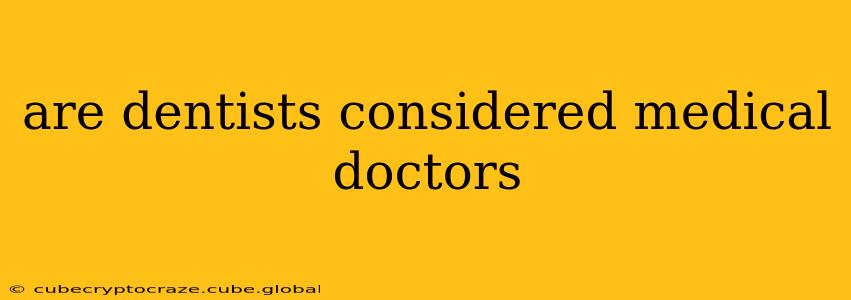Are Dentists Considered Medical Doctors?
The short answer is no, dentists are not considered medical doctors (MDs). While both professions are vital to overall health and well-being, they possess distinct educational backgrounds, areas of expertise, and licensing requirements. This difference stems from the specialized nature of their respective fields.
Let's delve deeper into the nuances that distinguish dentists from medical doctors.
What is the difference between a dentist and a medical doctor?
The core distinction lies in their focus: medical doctors (MDs or DOs) diagnose, treat, and prevent diseases and injuries across the entire human body. Their scope encompasses a vast range of systems and ailments. Dentists, on the other hand, specialize exclusively in the oral cavity—teeth, gums, jaws, and the surrounding structures. Their expertise centers on oral health, preventing and treating conditions like cavities, gum disease, and temporomandibular joint (TMJ) disorders.
What type of education do dentists receive?
Dentists undergo rigorous training focused on oral health. After completing undergraduate studies, aspiring dentists pursue a Doctor of Dental Surgery (DDS) or Doctor of Dental Medicine (DMD) degree. This involves four years of intensive coursework, including anatomy, physiology, biochemistry, microbiology, and, crucially, extensive hands-on clinical experience. This education provides the specialized knowledge and skills necessary for diagnosing and treating oral conditions.
Do dentists have medical training?
While dentists receive some medical training as part of their curriculum, it is significantly less comprehensive than that of medical doctors. Their medical knowledge is primarily relevant to the oral cavity and its interconnected systems. They are trained to recognize systemic conditions that may manifest in the mouth, but their primary focus and expertise remain within the realm of oral health.
What are the licensing requirements for dentists?
Similar to MDs, dentists must pass rigorous licensing examinations to practice. These examinations assess their knowledge and skills in various aspects of dentistry. The specific requirements vary by state or region, but all involve comprehensive testing and often include practical assessments of clinical skills.
Can dentists perform medical procedures?
Generally, no. Dentists are not licensed to perform medical procedures outside their scope of practice. This restriction is in place to ensure patient safety and maintain professional standards. However, they can often identify systemic health issues that require medical attention and will refer patients to the appropriate healthcare professionals.
Are there any overlaps between dentistry and medicine?
While their core practices differ, there are areas of overlap. For example, both professions may deal with patients experiencing oral manifestations of systemic diseases, such as diabetes or HIV. Furthermore, some dentists specialize in areas that touch upon medical fields, such as oral surgery (which may involve procedures akin to some surgical specialties in medicine). However, even in these areas, the dentist's primary focus remains oral health.
In conclusion, while dentists and medical doctors both contribute to overall health, they are distinct professions with different educational paths, scopes of practice, and licensing requirements. Dentists are not medical doctors, but their role is equally crucial in maintaining optimal health and well-being.
